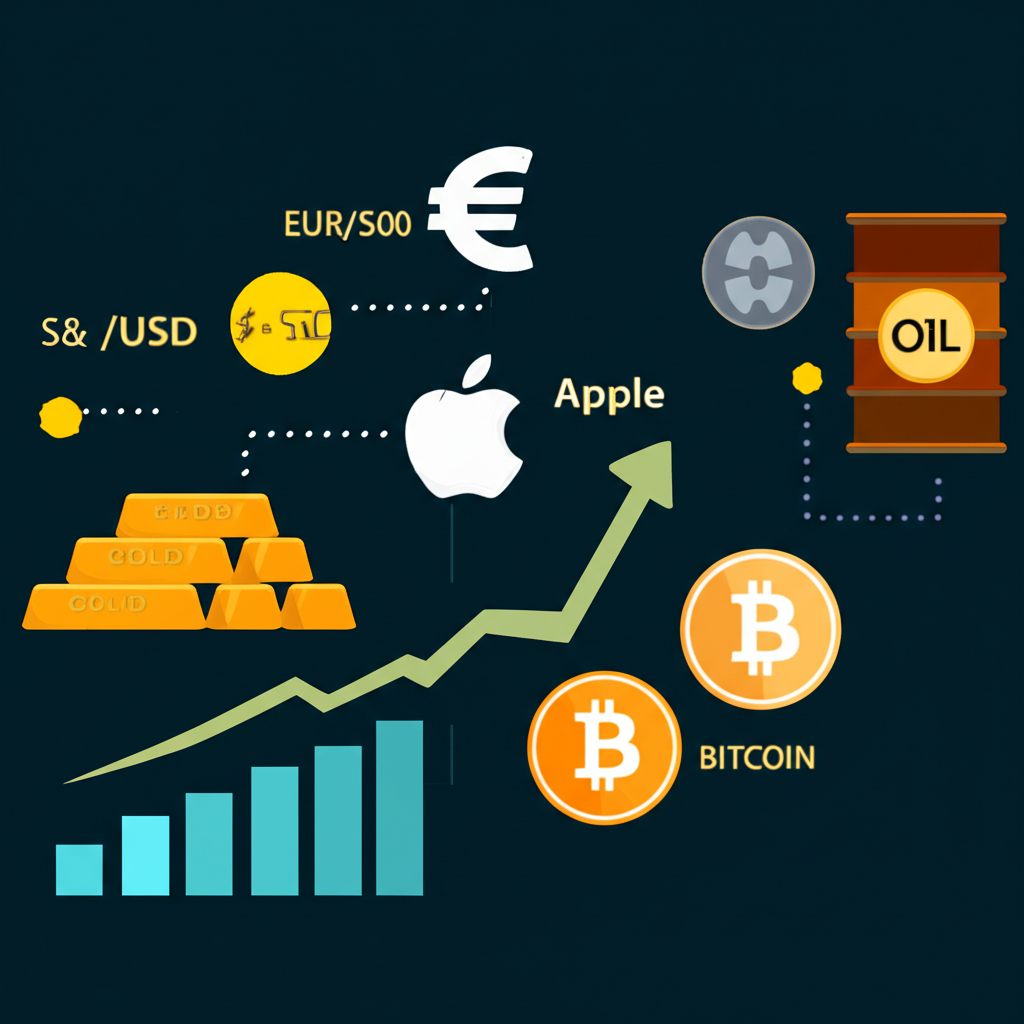Introduction: What is a CFD Platform and Why is Choosing Wisely Crucial?
A CFD platform acts as your entry point into the dynamic world of Contracts for Difference, allowing traders to speculate on price movements across a wide range of financial markets without ever owning the underlying assets. These platforms combine advanced trading tools, real-time data, and fast execution to support opening, managing, and closing positions efficiently. The choice of platform isn’t just a matter of convenience—it directly shapes your trading performance, cost structure, market access, and the safety of your funds. With countless providers operating globally, distinguishing a trustworthy, high-performing platform from a risky or underwhelming one is essential for both new and seasoned traders. This guide breaks down everything you need to know about CFD platforms, from core mechanics and asset types to critical selection factors and the complex regulatory environment—especially for those based in the United States.

Understanding CFDs: Key Concepts for Beginners
Contracts for Difference (CFDs) are derivative financial products that let traders profit from price changes in assets like stocks, currencies, indices, and commodities—without needing to own them. When you open a CFD trade, you’re agreeing with your broker to exchange the difference in an asset’s price between when the position opens and closes. If you anticipate a price increase, you go long (buy); if you expect a drop, you go short (sell). This flexibility allows for profit potential in both rising and falling markets.
CFDs mirror the value of real-world assets, including forex pairs, individual equities, stock indices, raw materials, and digital currencies. One of their defining features is leverage. Leverage enables you to control a large position using only a fraction of the total value—known as margin. While this can boost gains, it also increases the risk of significant losses, sometimes exceeding your initial deposit. Because of this, CFDs are considered high-risk instruments, and a solid grasp of how they work is vital before placing any real trades.

The Most Common Types of CFDs
CFDs provide access to a broad spectrum of global financial markets, each offering unique opportunities and risk profiles:
- Forex CFDs: Enable speculation on currency pair movements such as EUR/USD or GBP/JPY. Known for high liquidity and tight spreads, these are popular among short-term traders and often come with substantial leverage.
- Share CFDs: Let you trade on the price of individual company stocks—like Apple or Tesla—without purchasing actual shares. This opens the door to short-selling and leveraged exposure across thousands of global equities.
- Index CFDs: Reflect the performance of market benchmarks such as the S&P 500, FTSE 100, or DAX 40. They offer a way to gain diversified exposure to entire economies or sectors with a single trade.
- Commodity CFDs: Allow speculation on raw materials including gold, silver, crude oil, natural gas, and agricultural goods. Prices are often driven by supply and demand, geopolitical events, and macroeconomic trends.
- Cryptocurrency CFDs: Provide a way to trade on the volatility of digital assets like Bitcoin, Ethereum, and Ripple without managing wallets or private keys. While potentially lucrative, these are among the most volatile CFDs available.

The Regulatory Landscape of CFDs in the US: What Every Trader Needs to Know
For anyone living in the United States, this section is especially important. Retail CFD trading is effectively banned for U.S. residents. This restriction is enforced by two major regulatory bodies: the Commodity Futures Trading Commission (CFTC) and the Securities and Exchange Commission (SEC). The primary motivation behind the ban is investor protection. Regulators view CFDs as excessively risky due to their high leverage and over-the-counter (OTC) structure, which lacks the transparency and oversight of exchange-traded instruments. The potential for rapid and severe financial loss is considered too great for the average retail trader.
As a result, no U.S.-regulated broker can legally offer CFDs to American clients. Brokers that do provide CFD trading typically operate under foreign regulators such as the UK’s Financial Conduct Authority (FCA), Cyprus Securities and Exchange Commission (CySEC), or Australia’s ASIC. While these agencies enforce strong rules in their own regions, their protections do not extend to U.S. citizens trading from within the country. Attempting to bypass these rules—by using offshore brokers or falsifying residency—can lead to legal trouble, account closures, and financial loss.
Options and Considerations for US Residents
Given the strict regulatory environment, U.S. traders have very few legitimate paths to CFD trading, and each comes with serious limitations:
- Professional Client Status: Some international brokers allow CFD trading for “professional clients” who meet strict financial and experience requirements—such as holding over $500,000 in investable assets and having significant trading history. This option is not available to the average retail investor.
- Relocation: A U.S. citizen could theoretically move to a country where CFDs are permitted, establish legal residency, and open an account with a local broker. However, this involves major tax, legal, and lifestyle changes, making it impractical for most people.
- Regulated Alternatives: For U.S. residents, the best approach is to explore legal, regulated instruments that offer similar functionality. Futures contracts and options on stocks, indices, commodities, and currencies are fully compliant with CFTC and SEC rules. These products also support leverage, short-selling, and speculation on price movements. While they differ in structure from CFDs, they serve many of the same strategic purposes without the legal and financial risks. For accurate, up-to-date information on derivatives regulation, visit the official Commodity Futures Trading Commission (CFTC) website.

Key Factors for Choosing the Best CFD Platform
For traders outside the U.S. or those who qualify as professional clients, selecting the right CFD platform requires careful evaluation. The decision impacts everything from trade execution and costs to security and long-term success. Here are the most important factors to consider.
Regulation and Broker Security
The most critical factor is the broker’s regulatory standing. Always choose a platform regulated by a reputable financial authority such as the FCA (UK), ASIC (Australia), or CySEC (Cyprus). These regulators enforce strict rules on capital requirements, client fund protection, and fair trading practices. A key safeguard is client fund segregation—your money should be held in separate accounts at top-tier banks, isolated from the broker’s operational funds. This ensures your capital is protected if the broker faces financial difficulties. You can verify a broker’s license by checking the official register of the relevant regulator, such as the Financial Conduct Authority (FCA) in the UK.
Costs and Commissions: Spreads, Swaps, and Fees
Trading costs directly affect your profitability. CFD brokers typically earn revenue through spreads, commissions, and overnight financing charges.
- Spreads: The difference between the buy and sell price. These can be fixed or variable, with variable spreads often widening during volatile market conditions. Look for competitive spreads on the assets you trade most.
- Commissions: Some brokers charge a fee per trade, especially on stock CFDs. Others offer commission-free trading but compensate with slightly wider spreads.
- Overnight (Swap) Fees: Holding a position overnight usually incurs a financing cost (or credit), based on interest rate differentials. These can add up over time, particularly in long-term trades.
- Other Fees: Watch out for inactivity fees, withdrawal charges, or currency conversion costs. A transparent fee structure is a sign of a trustworthy broker.
Variety of Available Assets
A strong CFD platform should offer a wide selection of markets to support diversification and strategic flexibility. Look for access to:
- Major, minor, and exotic forex pairs
- Global stocks from major exchanges like the NYSE, NASDAQ, and LSE
- Key indices such as the S&P 500, DAX, and Nikkei 225
- Commodities including gold, silver, oil, and natural gas
- Popular cryptocurrency CFDs like Bitcoin and Ethereum
Trading Platform Functionalities
The platform interface is your main tool for interacting with the market. It should be intuitive, reliable, and packed with useful features. Key qualities include:
- User Experience: Clean layout, logical navigation, and customizable dashboards.
- Charting and Analysis: Advanced technical indicators, drawing tools, and multiple timeframes.
- Execution Quality: Fast order processing and minimal slippage, especially during high volatility.
- Order Types: Support for market, limit, stop-loss, take-profit, and trailing stop orders.
- Mobile Access: A fully functional mobile app for iOS and Android.
- Automation: Compatibility with algorithmic trading systems like Expert Advisors (EAs), commonly found on MetaTrader 4/5 or cTrader.
Many brokers offer well-known platforms such as MetaTrader 4 (MT4) and MetaTrader 5 (MT5), praised for their customization and global adoption. Others provide proprietary platforms that may offer a more streamlined or innovative user experience.
Customer Support and Educational Resources
Responsive customer service is essential, especially when technical or financial issues arise. Evaluate the broker’s support availability—24/5 or 24/7 is ideal—and the channels offered, such as live chat, phone, and email. Multilingual support is a bonus for international traders. Equally important is the quality of educational content. A broker that invests in trader development typically offers:
- Detailed guides and articles on trading strategies and market analysis
- Live and recorded webinars
- Market research and economic calendars
- A free demo account to practice risk-free
The Best CFD Platforms: Analysis and Comparison (For Non-US Residents or Professionals)
This section highlights some of the most respected CFD platforms available internationally. It’s important to emphasize that these services are generally not accessible to retail traders in the United States due to regulatory restrictions. They primarily serve clients in Europe, Asia, Australia, and other regions where CFD trading is permitted.
Below is a comparison of leading brokers in the global CFD space:
| Broker Name | Key Strengths | Regulatory Status (Examples) | Available Assets | Trading Platforms | Spreads (Example) | Notes for US Residents |
| IG | Extensive market selection, strong global regulation, in-depth research | FCA (UK), ASIC (Aus), BaFin (Ger) | 17,000+ (Forex, Indices, Shares, Commodities, Crypto) | Proprietary, MT4 | From 0.6 pips (EUR/USD) | Not available for US retail traders. |
| Plus500 | Simple, intuitive platform, broad asset range | FCA (UK), CySEC (Cyprus), ASIC (Aus) | 2,000+ (Forex, Indices, Shares, Commodities, Crypto) | Proprietary | Variable (e.g., 0.8 pips EUR/USD) | Not available for US retail traders. |
| eToro | Social trading, copy trading, strong crypto presence | CySEC (Cyprus), FCA (UK), ASIC (Aus) | Forex, Crypto, Stocks, Indices, Commodities | Proprietary | Variable (e.g., 1.0 pips EUR/USD) | Available for crypto and stock investing in US, but not CFDs. |
| CMC Markets | Advanced tools, competitive pricing, wide market access | FCA (UK), ASIC (Aus), MAS (SG) | 10,000+ (Forex, Indices, Shares, Commodities, Crypto) | Proprietary (Next Gen), MT4 | From 0.7 pips (EUR/USD) | Not available for US retail traders. |
IG: Detailed Review
IG is widely recognized as a leader in the CFD industry, known for its vast market selection and strong regulatory credentials. It operates under multiple top-tier regulators, providing a high level of investor protection.
Pros:
- Offers access to over 17,000 markets, including forex, global equities, indices, commodities, and cryptocurrencies.
- Supports both its own advanced platform and MetaTrader 4, catering to a wide range of trader preferences.
- Provides extensive research, market analysis, and educational content, including live webinars.
- Competitive spreads and transparent pricing with no hidden fees.
Cons:
- Higher minimum deposit requirements for certain account types.
- The platform’s depth of features may be overwhelming for complete beginners.
Plus500: Detailed Review
Plus500 is known for its clean, easy-to-use interface, making it a favorite among new traders and those who prefer simplicity. It delivers a broad range of CFDs without the complexity of advanced trading tools.
Pros:
- Intuitive proprietary platform with a low learning curve.
- Offers CFDs on forex, indices, commodities, stocks, and a wide variety of cryptocurrencies.
- Regulated in multiple jurisdictions, including the UK, Australia, and Cyprus.
- No commission charges—revenue is generated through spreads.
Cons:
- Does not support MetaTrader platforms.
- Limited educational materials compared to competitors.
- Customer support is available via email and live chat, but phone support is not offered.
eToro: Detailed Review
eToro stands out for its social trading capabilities, allowing users to follow and automatically copy the trades of experienced investors. While it’s popular for crypto and stock investing, it also offers CFD trading in many international markets.
Pros:
- Industry-leading social and copy trading features.
- Simple, user-friendly interface suitable for beginners.
- Wide range of assets, including real stocks (in certain regions) and digital currencies.
- Active trading community for idea sharing and collaboration.
Cons:
- Spreads tend to be wider than some competitors.
- Relies solely on its proprietary platform—no MT4 or MT5 integration.
- For U.S. users, only stock and crypto investing is available; CFD trading is not permitted.
Risks and Warnings When Trading CFDs
CFDs are complex financial instruments that carry a high risk of losing money quickly due to leverage. Studies show that a large percentage of retail traders lose money when trading CFDs. It’s essential to fully understand the risks before risking any capital.
- Leverage Increases Losses: While leverage can multiply gains, it can also cause losses to exceed your initial deposit, especially in fast-moving markets.
- Market Volatility: Prices can shift rapidly due to news, economic data, or geopolitical events, leading to unexpected outcomes.
- Margin Calls: If your trade moves against you, your broker may require additional funds to keep the position open—or close it automatically.
- Overnight Financing: Holding positions overnight incurs swap fees, which can reduce profits over time.
- Counterparty Risk: Since you’re trading with the broker, not on an exchange, there’s a risk the broker could fail. This is reduced by choosing a well-regulated provider.
Never risk money you can’t afford to lose. Always use risk management tools like stop-loss orders, control your position size, and avoid putting more than a small percentage of your capital into any single trade.
Conclusion: Making an Informed Decision About Your CFD Platform
Selecting a CFD platform is a decision that demands careful thought. For traders outside the U.S. or those who meet professional client criteria, the ideal platform should offer strong regulation, low and transparent costs, a wide range of tradable assets, a powerful and user-friendly interface, and reliable customer support. Prioritizing brokers with oversight from respected financial authorities is the best way to protect your funds and ensure fair trading conditions.
For U.S. residents, the situation is clear: retail CFD trading is not allowed. Attempting to bypass this rule through offshore brokers or false declarations can lead to serious consequences. Instead, focus on legal alternatives like futures and options, which are regulated and offer similar trading opportunities. No matter where you’re based, doing thorough research, understanding the risks of leveraged trading, and starting with a demo account are essential steps before going live. Knowledge is your strongest tool—use it to choose a platform that fits your goals, risk tolerance, and regulatory environment.
What is a CFD platform and how does it differ from a traditional broker?
A CFD platform is an online service provided by a broker that allows you to trade Contracts for Difference. Unlike traditional stockbrokers where you buy and own shares, a CFD platform enables you to speculate on the price movements of an asset (like stocks, forex, or commodities) without actually owning it. You enter into a contract with the broker to exchange the difference in the asset’s price between opening and closing the trade. This often involves leverage, which is less common in traditional equity brokerage.
Why are retail CFDs prohibited in the United States and what are the implications for traders?
Retail CFDs are prohibited in the U.S. primarily due to concerns about investor protection. Regulators like the CFTC and SEC deem CFDs as overly complex and high-risk for the average retail investor, largely because of the significant leverage involved, which can lead to substantial losses rapidly. For U.S. residents, this means it is illegal to trade CFDs with any broker regulated within the United States. Attempting to trade with unregulated offshore brokers or misrepresenting residency can lead to legal and financial repercussions.
Are there legal ways for U.S. residents to trade CFDs?
For the vast majority of U.S. retail residents, no. There are no legal ways to trade CFDs in the U.S. market. Very limited exceptions exist for “professional clients” who meet extremely high asset and experience thresholds, as defined by non-U.S. regulators. Relocating residency to a country where CFDs are legal is a complex and impractical solution for most. U.S. residents are encouraged to explore regulated alternatives such as futures and options contracts for similar speculative opportunities.
What are the most important criteria to consider when choosing a CFD platform?
Key criteria include:
- Regulation and Security: Ensure the broker is regulated by a reputable financial authority (e.g., FCA, ASIC, CySEC).
- Costs and Fees: Compare spreads, commissions, overnight (swap) fees, and other potential charges.
- Asset Variety: Check the range of CFDs offered (forex, stocks, indices, commodities, crypto).
- Trading Platform: Evaluate user-friendliness, charting tools, execution speed, and mobile app quality.
- Customer Support: Assess availability, responsiveness, and language options.
- Educational Resources: Look for learning materials, webinars, and a demo account.
What types of assets can be traded through CFD platforms?
CFD platforms typically offer a wide range of underlying assets for speculation, including:
- **Forex:** Major, minor, and exotic currency pairs.
- **Stocks:** Individual company shares from global exchanges.
- **Indices:** Baskets of stocks representing a market (e.g., S&P 500, FTSE 100).
- **Commodities:** Raw materials like gold, oil, silver, and natural gas.
- **Cryptocurrencies:** Popular digital currencies such as Bitcoin and Ethereum.
How does leverage work in CFD trading and what are its associated risks?
Leverage allows you to control a larger trading position with a smaller amount of capital (margin). For example, 30:1 leverage means you can control a $30,000 position with just $1,000 of your own money. While leverage can significantly amplify potential profits, it also magnifies potential losses. If the market moves against your leveraged position, you can lose more than your initial deposit very quickly, leading to margin calls and even debt to the broker.
What security and regulatory measures should you look for in a CFD platform?
Always choose a platform regulated by a top-tier financial authority (e.g., FCA, ASIC, CySEC). Key security measures include:
- **Client Fund Segregation:** Your funds should be held in separate bank accounts from the broker’s operational capital.
- **Investor Compensation Schemes:** Some regulators offer schemes that protect client funds up to a certain amount in case of broker insolvency.
- **Negative Balance Protection:** Ensures you cannot lose more than the funds in your trading account.
- **Transparent Pricing and Execution:** Clear display of spreads, commissions, and reliable trade execution.
Which CFD platforms are considered the best globally, and are they accessible from the U.S.?
Globally, platforms like IG, Plus500, and CMC Markets are often highly rated for their features, asset range, and regulatory compliance. However, it is crucial to understand that **these platforms are generally NOT accessible to retail traders residing in the United States** due to the U.S. regulatory ban on retail CFD trading. Their services are available in regions where CFDs are permitted.
What is the difference between spreads and commissions on a CFD platform?
Spreads are the difference between the buy (ask) and sell (bid) price of an asset, representing the broker’s primary way of profiting from trades. They can be fixed or variable. Commissions are a separate fee charged by the broker for opening or closing a trade, often a fixed amount per lot or a percentage of the trade value. Some brokers offer commission-free trading with wider spreads, while others charge commissions on top of tighter spreads.
Is it advisable to start with a demo account before trading with real money on a CFD platform?
Absolutely, starting with a demo account is highly recommended for all traders, especially beginners. A demo account allows you to:
- Familiarize yourself with the platform’s interface and tools.
- Practice trading strategies without risking real capital.
- Understand the mechanics of CFD trading, including leverage and margin.
- Test the broker’s execution speed and pricing in a simulated environment.
It’s an invaluable tool for gaining experience and confidence before transitioning to live trading.

留言